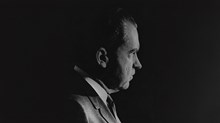News of Antony of Egypt, especially his sacrificial solitude, spread widely long before he died. At Rome, Marcella, a wealthy noblewoman already widowed at age 17, heard about him around 340, and in response, turned her mansion into an ascetic community devoted to prayer and Bible study. Other Roman matrons followed her pioneering example.
But when Athanasius, who had been one of those who told Marcella about Antony, put Antony's story down in writing, Antony's influence became greater still. As Athanasius told his readers at the beginning of his Life of Antony, "I feel that, once you have heard the story, you will not merely admire the man but will wish to emulate his commitment as well."
Within a decade or so of publication, a Latin version (Athanasius wrote the Life in Greek) had been published and a copy came into the hands of two Roman officials in Trier, a prosperous regional center in what is now part of Germany.
As one ancient account records, "One of them began to read it. He was amazed and set on fire . …He was filled with holy love and sobering shame. Angry with himself, he turned his eyes on his friend and said to him: 'Tell me, I beg you, what do we hope to achieve with all our labors? What is our aim in life? … Can we hope for any higher office in the palace than to be friends of the emperor? … If I wish to become God's friend, in an instant I may become that now.' "
He turned back to the book in turmoil as he experienced an inner conversion. "I have decided to serve God," he said, "and I propose to start doing that from this hour in this place." His companion joined him in this resolve. Soon their wives followed suit, vowing themselves to ascetic abstinence.
We know this dramatic story from Ponticianus, who told it in the mid-380s to an imperial official in Milan, a man named Augustine. Ponticianus was a high imperial official, an African (like Augustine) and a baptized Christian believer (unlike Augustine).
He was surprised one day to find Augustine and his friend Alypius reading the letters of Paul. As they talked, Ponticianius told them about Antony of Egypt and his extraordinary life—and discovered with astonishment that Augustine and Alypius had never heard of Antony nor "the flocks in the monasteries and their manner of life well pleasing to God and the fertile deserts of the wilderness."
As Ponticianus spoke, Augustine, just like the civil servants in Trier, was "violently overcome by a fearful sense of shame." The intellectual arguments that might have kept him from following these humbling examples had all been exhausted. Dare he face liberation from "the treadmill of habit?" In the heat of passion, his words to Alypius, as Augustine later put it in his Confessions, "said less about the state of my mind than my brow, cheeks, eyes, color and tone of voice."
They went into the garden, where Augustine's struggles of soul raged on until he heard a child's voice telling him, "Take up and read." He remembered Antony's decisive response to an apparently chance hearing of the words of Jesus, "Go sell all you have … and come, follow me" (Matt. 19:21). For Augustine, it was Romans 13:13-14 as Paul's letter fell open: "Put on the Lord Jesus Christ and make no provision for the lusts of the flesh." For Augustine conversion to Christianity was inseparable from commitment to a life of ascetic discipline.
Athanasius's purpose in writing Antony's Life had gained its greatest success: Augustine would become the greatest theologian in the church for the next 1,000 years.
David Wright, University of Edinburgh
For more information on this topic, see:
Medieval Sourcebook: Athanasius: Life of Antony, Full Text
http://www.fordham.edu/halsall/basis/vita-antony.html
ATHANASIUS, St, Bishop of Alexandria
http://www.ccel.org/a/athanasius/athanasius-EB.html
Augustine's Confessions
http://ccat.sas.upenn.edu/jod/Englishconfessions.html
Copyright © 1999 by the author or Christianity Today/Christian History magazine.
Click here for reprint information on Christian History.

Support Our Work
Subscribe to CT for less than $4.25/month




























